|
As the ongoing coronavirus pandemic eventually allowed for opportunities to leave the home, one of the most meaningful greetings which welcomed my return to Mass were the familiar words, “Peace be with you.” The calming presence of the parish priest eased the troubles of my mind, soothed the restlessness of my heart, and enlivened my soul to sing, “Let us go unto the House of the Lord!” While the celebration of the Holy Sacrifice of the Mass and the reception of our Lord in Holy Communion immediately made up for the lost time during the pandemic, there were other reminders that we had been away: new priest assignments, reminders to exchange the weekly offering envelopes, many parishioners enthusiastically greeting each other in happy parking lot reunions, our pastor sporting a new beard, and someone even observing, “You’ve lost some weight, Father!”
The place our parish priests hold in our hearts is a treasured one. We depend on them to teach us through homilies, expose the Blessed Sacrament, listen to our sins and offer absolution, preside over the nuptial Mass, baptize our children, anoint the sick, and console us through times of death. And that’s just the minimum. While the rest of us are busy at work, school, or caring for our households, our parish priests are meeting with the church leadership, making rounds at schools or hospitals, organizing retreats and special services, offering spiritual guidance, and working at the rectory. But caring for the spiritual needs of hundreds of parishioners does not end at 5 PM. Starting from the sacred occasion of ordination, a priest is always on-call. Who rushes to the side of the dying, cares for those who have lost everything, counsels those in conflict, or ministers through any number of crises? Who faces the mounting expenses and bills of the parish, limited Sunday collections, possible stagnation of new family registrations, and who perhaps lacks as many helpful hands as he would like to keep the place running smoothly? Especially through this pandemic, the parish priest again and again is called to bring us into an encounter with Jesus Christ as best he can with whatever resources are at his disposal. If caring for our household’s needs presents a challenge, just imagine how the parish priest feels overseeing his parish! As the Church celebrates the feast day of St. John Vianney, we can see how so many of the priests in our lives emulate the example of the Curé d'Ars, who himself followed the example of the priesthood of Jesus Christ. The French Revolution resulted in an increase of the population’s ignorance of and indifference to religion. As a result, St. John Vianney went about his priesthood by spending at least 11 or 12 hours a day in the confessional in the winter; longer still in the summer. The simple piety of this holy priest not only brought about many conversions for the Church, but reinvigorated the faith in areas where secularism had long dominated the culture. Likewise, by immersing themselves into the daily lives of our communities, our parish priests “serve ‘in the trenches,’ bearing the burden of the day and the heat (cf. Mt 20:12), confronting an endless variety of situations in [their efforts] to care for and accompany God’s people.” Pope Francis continued, in his 2019 letter to priests commemorating the 160th anniversary of the death of St. John Vianney, to express his closeness and solidarity to priests. He also expressed personal gratitude “for your fidelity to the commitments you have made… [and] for the joy with which you have offered your lives.” The Holy Father concluded his letter by praising the witness of their shared vocation: For I am confident that “God takes away even the hardest stones against which our hopes and expectations crash: death, sin, fear, worldliness. Human history does not end before a tombstone, because today it encounters the “living stone” (cf. 1 Pet 2:4), the risen Jesus. We, as Church, are built on him, and, even when we grow disheartened and tempted to judge everything in the light of our failures, he comes to make all things new.” … May we be men whose lives bear witness to the compassion and mercy that Jesus alone can bestow on us. Let us strive to show the priests in our lives our gratitude and support. May many men continue to discern and answer the call of our Lord to the sacred work of ordained ministry. As we answer the universal call to holiness in our own lives, may we also support those who have dedicated their lives to answer, “Here I am. I come to do Your will.” To learn more about Holy Orders, listen to our latest podcast here.
0 Comments
Besides receiving and visiting Our Lord in the Blessed Sacrament at Mass and Adoration, I find that the most nourishing aspect of my spiritual life is friendship with the saints. The Church holds celebrating the saints and asking for their intercession in high regard, as the Solemnity of All Saints, which falls on November 1st each year, is a holy day of obligation. The Vigil of All Saints, then, falls on October 31st each year. One goal of the Christian is to engage in prayer with God, and prayer, simply put, is conversing with God. Each day, we can offer our work to God and talk to Him frequently. This is not always easy, though, and I have found that friendship with the saints helps immensely. A friendship, which is the mutual willing of the good between people, is cultivated with communication and time spent together. Aristotle and Shakespeare, in their genius commentaries on friendship, always return to the simplicity of authentic friendship. Developing a friendship with the saints does not need to be overly-complex. It can also be founded upon communication and time spent together, ultimately bringing us closer to God and strengthening our communication with Him. Communicating daily with the saints further orients our minds to the supernatural, to the existence of the “things…invisible” that we recite in the Creed, and it also strengthens us in the fight for our souls. By communicating with the saints, we will become more like the saints, who in their devotion to Christ became like Christ. Thus, the saints will help us to become more Christ-like. The poet Gerard Manley Hopkins gets at this point in one of his poems: I say móre: the just man justices; Keeps grace: thát keeps all his goings graces; Acts in God's eye what in God's eye he is -- Chríst — for Christ plays in ten thousand places, Lovely in limbs, and lovely in eyes not his To the Father through the features of men's faces. The “just man” is the saint, and the saint’s Christ-like actions help him to become like Christ. As I mentioned in my last blog, stories of the saints are dramas of the highest caliber. Each saint had a unique personality and found their way to heaven in their own special, grace-filled way. There are so many saints that everyone can find someone they relate to or want to emulate. Below, I have listed just a few of my friends, and I pray that they will intercede for you! Sts. Peter and Paul, St. Edmund Campion, St. Ignatius, St. John the Beloved Disciple, St. Luke, St. Catherine of Sienna, St. John Paul II, Bl. Pier Giorgio Frassati, Bl. John Henry Newman, Sts. Thomas More and John Fisher, St. Robert Southwell, St. Henry Walpole, St. Aloysius Gonzaga, St. Robert Bellarmine, St. John Berchmans, St. Francis Xavier, St. Leo the Great, St. Augustine, St. Vincent Pallotti, St. Thomas Aquinas, St. Therese of Lisieux, St. Teresa of Avila, St. Josemaria Escriva, St. John Vianney, St. Joseph, Guardian Angels, Our Lady… Ora pro nobis! “The priesthood is the love of the heart of Jesus. When you see a priest, think of our Lord Jesus Christ." - St. John Marie Vianney Everything about my experience of Catholicism growing up led me to believe that priests were always kind, middle-aged men who had their act together, but were fairly inaccessible. It seemed that the Church was dying, men were no longer answering the call to the priesthood, and a life of faith had become irrelevant, right? Wrong. My perspective changed freshman year of college at The Catholic University of America. I was astounded to see younger men with collars, and even more astounded to learn that these men, who weren’t much different from me, were willing to give up everything (a family, career, independent life) for the glory of God and the good of His people. As I have come into my own life of faith and started working full-time for the Church, I consider it a great honor to call many of these courageous men my friends. Priests serve as a constant reminder that God, in His goodness, never intended for us to experience life alone. Through their relationships, their witness, and the sacraments, priests prove that God never abandons His people. Simply put, the Church would not exist without the sacraments (the Eucharist, in particular), and the Church could not exist without the priests who bring these sacraments to us each and every day. Over the last several years, as I have seen friends go through seminary and get ordained, I have grown in appreciation of how great their sacrifice is. But more than that, I have also seen how great the reward is when we throw ourselves into our vocation with reckless abandon. I remember distinctly asking one dear friend how he could do it all – leave behind everything that the world tells him he needs in pursuit of a higher calling – and he simply looked me in the eye and said, “Lauren, the Lord makes it easy.” These men have not only been a beautiful witness for the world, but they have radically helped shape the course of my life and my heart. At every major crossroads of a person’s life – birth, marriage, growth of a family, death – a priest is there offering himself and bringing the sacraments. The men in formation for the holy priesthood and the priests who are out in the world “in the trenches” deserve our gratitude and our prayers. The priesthood shows the world that God’s people are worth giving up everything for. So to all of you priests: thank you. Thank you for bringing us the Eucharist. Thank you for answering tear-filled phone calls. Thank you for teaching us how to be good friends. Thank you for showing us the importance of relationships rooted in prayer. Thank you for being our brothers and for personifying our Heavenly Father. But most importantly, thank you for showing us the joy that comes when we fully surrender our lives and our wills to the one who is Love. Question for Reflection : Have you ever experienced the love of Christ through the ministerial priesthood ? To learn more about vocational discernment, please click here. 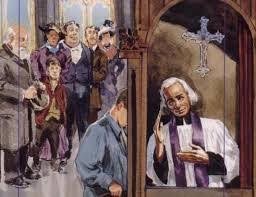 Every interaction, every conversation, each and every dive into our relational natures as human beings begins with the willing openness to listen. Listening begins with a simple opening, a knock on the door of our self-focus that lets us know that someone else is here, present before us with a unique existence, one that should be experienced and embraced. Listening happens in almost everything we do in our daily lives, whether we are speaking with others, learning instructions, praying, or even sitting alone in the quiet of an empty house. There is always something to hear, always something to experience. To listen is to see the beauty and worth in another and embrace this by joining another in his or her own life’s journey, wherever they may be, in whatever they are going through. I often say that listening is an art. We are all great artisans of speech, one way or another. Whether outspoken and personable, or soft-spoken and shy, we all have an inner preacher within us that constantly narrates our thoughts, opinions, and daily lives. To speak is in our nature, and to listen is also a part of who we are. Speaking, however, often seems easier than listening. Children, constantly having to be reminded to give each person his turn to speak, exemplify this. Why is it hard to listen? I think the life of Saint John Marie Vianney, whose feast we celebrate today, can show us some answers. Looking into his life, one can see just how important and powerful the art of listening is for us all. Listening is something that can be appreciated in others and within ourselves in an almost artistic way, such as when we read the great sonnets of Shakespeare, or admire Monet’s Water Lilies. Listening has its own beauty within it, as all things do. It is in itself a beautiful thing. Saint John Vianney, I believe, knew the power that listening wields. As a priest in the farmlands of France, traveling around to spiritually devastated towns, he would plop himself down in a confessional and just sit there, waiting. In time, townspeople started coming and speaking to him. He heard confessions for long lengths of time each day, listening to the needs of the people of France. Slowly and surely, each town he visited began beaming with a light and a warmth that didn't exist before. Besides hearing the townspeople’s confessions, John Vianney validated and embraced their lives in his own, welcoming all and listening with an open heart. He embraced fully the priesthood as a way to listen to others, to join into the community of all, to embrace and see the worth in others and to let others know that Christ sees their worth as well. He did this through devout prayer to God and a humble heart to listen to God’s plan for him. It is by this profound listening that John Vianney became the well-known Patron of Priests that he is today. John Vianney teaches us that listening can save lives. Regardless of how small a conversation may be, to listen is to embrace another, to shine forth that spirit of community that builds the foundation for the One, Holy, Catholic, and Apostolic Church. Each and every person has something to say and is worth the time. Vianney also teaches us to listen to God, to listen to the silence we so often get in response to our prayers that the answer is there, in our life. God listens to us always, in everything we do; all we need to do is learn to embrace ourselves the way God embraces us when He listens to our lives. As we continue on our journeys, I pray that the art of listening may inspire and shine beautifully in our interactions with others each day and in our prayers to the Almighty Father. William Clemens is a Undergraduate Student of Theology & Religious Studies at The Catholic University of America in Washington, D.C.
As Catholics, we have the great fortune of having at our fingers an inexhaustible treasure trove of prayers to guide us in countless meditations, devotions, intercessions, and spiritual exercises. All of it is oriented to helping us recognize and remember God’s presence in our lives, and to call upon Him in thanksgiving, praise, petition, intercession, or blessing and adoration. The Church, of course, does not hold a monopoly over the varying forms of prayer but continues to invite the faithful to contribute to her wealth and so grow in holiness and piety. As one makes his or her journey of faith, he or she will invariably develop preferences in offering prayers to the heavens which likely change as that person matures or has different experiences in life. Exposing oneself to the diversity of prayer is a wonderful thing as it allows one to personally discover and experience new dimensions of spirituality in our Faith.
Growing up, I had been accustomed to vocal prayer as it gave a feeling of substance to my calling upon the Lord and His response. For example, I would pray aloud during Mass and would hear God’s Word being proclaimed back to me. Of course, if I was not actively paying attention to that Word or if my mind or heart were absent, my prayers would be for naught and be reduced to mere words: “Whether or not our prayer is heard depends not on the number of words, but on the fervor of our souls” (St. John Chrysostom, see CCC 2700). The trouble I sometimes had with my private prayer was that I would be speaking to God without really listening for His reply. When I arrived at The Catholic University of America as a freshman I was immediately exposed to new expressions of the Faith. One of my favorite forms of prayer turned out to be radically different from everything I had encountered beforehand. At the first Praise and Worship Adoration of the year I was thrilled to be seated in the packed St. Paul’s chapel at 9 PM on a Wednesday. Even more so, I had never before experienced so much energy and emotion by a congregation (especially one consisting mainly of young people) poured into song. Immediately after the homily’s conclusion, however, the lights were turned off and everyone fell to their knees. In the darkness the only thing visible before us on the altar was the monstrance containing the Blessed Sacrament. The next ten or fifteen minutes served to introduce me to contemplative prayer, in which I was able to connect with our Lord in a new and incredibly intimate way. As St. John Vianney described the experience, “I look at him and he looks at me.” By focusing on His true and beautiful Presence before me, I forget about all the distractions in my life: the voices in my head scattering my thoughts, my desires, my worries, my exhaustion, etc. I simply place myself before Him and gaze at Him in the stillness. Scripturally, I’m reminded of Mary’s tender gazing at her Son as she held Him in her arms, both at His birth (cf. Matthew 2:11) and His death (cf. John 19:37), as well as Mary of Bethany’s gazing upon the Lord when He ministered to her household (see Luke 10:39). This silent but ineffable expression of love is not passive but an obedience— and test— of faith, especially as my senses cannot comprehend the Real Presence (see CCC 2715-2717). No matter what form of prayer one prefers, all prayer must be based in humility (see Matthew 23:12, CCC 2559-2560). It is God’s gift to us, especially since “we do not know how to pray as we ought” (Romans 8:26). As prayer is from the heart, “if our heart is far from God, the words of prayer are in vain” (CCC 2562; cf. CCC 2563). Finally, no matter what we pray for, we must never underestimate the power of our words. Pope Francis has stressed that “prayer, in the face of a problem, a difficult situation, a calamity… is opening the door to the Lord, so that He can do something. If we close the door, God can do nothing!” Like the Psalmist David sings, we can always find comfort and assurance in God’s presence: O God, you are my God, I seek you, my soul thirsts for you; my flesh faints for you, as in a dry and weary land where there is no water. So I have looked upon you in the sanctuary, beholding your power and glory. Because your steadfast love is better than life, my lips will praise you. So I will bless you as long as I live; I will lift up my hands and call on your name (Psalm 63:1-4). Thomas Wong is an undergraduate at The Catholic University of America in Washington, D.C. “So have you thought about becoming a priest?” As an altar server in my parish, many a priest (and well-meaning parishioner) would ask me this question as we were preparing for the celebration of Holy Mass. Even though this would stem from a casual conversation about my life, I was always somewhat taken aback by the harmless question put to me in that sacristy before I would automatically answer back to the smiling celebrant, “If God wills it!” To be honest, however, I felt lost. Some days I would think that being a priest was my calling, others that having a family was. In my life I would see hints of my calling everywhere— a Bible verse (i.e. Matthew 9:37) would tell me to be a priest while a smiling baby (and the occasional girl) would inspire me to be a dad. These mixed signals distressed me: despite my prayers, it seemed as if I would never get a firm answer to the life-changing question of what God wanted of me.
While I consider Saint Joseph my go-to-man for guidance on paternity, I look to Saint John Vianney, the patron of priests, for all matters concerning the Roman collar. The so-called “Curé of Ars” is an especially good model of strong will for both those preparing for the priesthood and anyone discerning God’s calling. From his youth he was filled with a great desire to “win souls for the good of God” by being a priest, though the turmoil of the French Revolution, having difficulty learning and memorizing in school, his father’s reluctance to not having him assist in the fields, being drafted into the military, suffering sickness, living amidst the government’s anti-Catholic persecution, and even being dismissed from the seminary in Lyon all stood in between the French man and his calling. At the age of 29, however, John Vianney was finally ordained, and he began to tend to the priestly and pastoral work in his parish. The same perseverance that enabled him to become a priest was now applied to the preparation of sermons, reflection on the works of spiritual writers and theologians, devotion to the Blessed Virgin Mary and Saint Philomena, self-mortification, and ministering through Eucharistic Adoration and the sacrament of Reconciliation. What an example of courage for those who today experience the grace of being called to the priesthood! With my own discernment process ongoing, I must remember that, despite the mixed signals I’m receiving as to what I am being called for, my vocation is not a problem to be solved! Rather, it is a personal call to holiness, one of joy and love. To worry excessively over this is to not allow God to work freely in my life nor trust that He will never lead me down the wrong path! Of course, the priesthood is not for everyone— fervent discernment will help determine if God is in fact calling a man to be consecrated in this way. Entering into a seminary is itself not a final decision but the best way to discover the authenticity of one’s vocation. Of course, the discernment process can also be started by simply conversing with a priest! In the Catholic Church, the role of the priest is vital. Tasked with the spiritual welfare of his flock, a priest is responsible for, but not limited to, celebrating daily Mass, administering the sacraments, offering counsel and comfort, leading retreats, catechizing, volunteering, and helping to run the parish community. He must be sensitive to the needs of his assignment while remaining obedient to the Church hierarchy. In addition, being a priest requires a 24/7 commitment with very little financial compensation;however, the reward for doing so— which is similarly offered to us all— is infinitely more fulfilling than a paycheck. In short, the priest is the mediator between God and His people. Just as Christ was sent by the Father, He in turn sent the Apostles into the world, so that “through them and their successors, the Bishops, He might continue to exercise His office of Teacher, Priest, and Shepherd… they are called to the service of the people of God” (Pope Francis’ homily given on Good Shepherd Sunday 2013, c.f. John 20:21-23). John Vianney similarly recognized the significant of the priesthood: “Oh, how great is a priest! The priest will not understand the greatness of his office till he is in Heaven. If he understood it on earth, he would die, not of fear, but of love.” Through the priest, we can glimpse the immense Love and grandeur of God: it is through him that Christ forgives our sins and through him that we receive the Body and Blood of our Lord. As I continue to discern my calling, I am reminded of all the priests God has placed in my life. These brave, holy, good, and faithful men of God have inspired me greatly with their joy, goodwill, patience, humility, and generosity in passing on the teachings of the Faith and caring for others. Like their patron, they trust in God to help them persevere through times of hardship and distress. They have readily answered God’s call of “Whom shall I send?” (Isaiah 6:8) and dedicated themselves to serving us through the example of Christ. They continuously pray for us; we must do the same for them! We are here today thanks to them. Thomas Wong is an undergraduate at The Catholic University of America in Washington, D.C. |
Details
Archives
July 2024
Categories
All
|
About |
Media |
© COPYRIGHT 2024 | ALL RIGHTS RESERVED

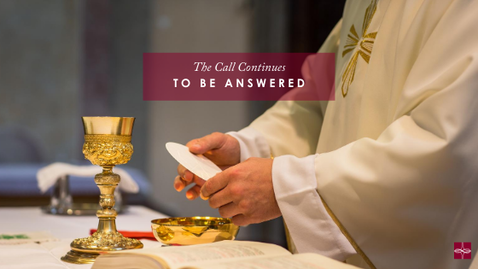

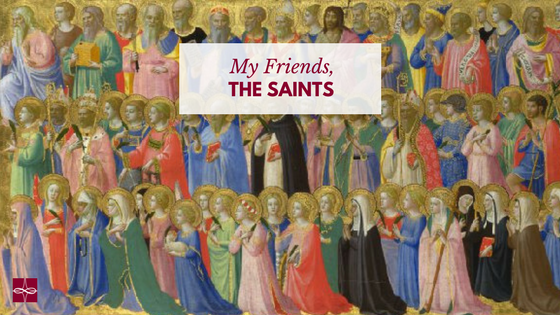

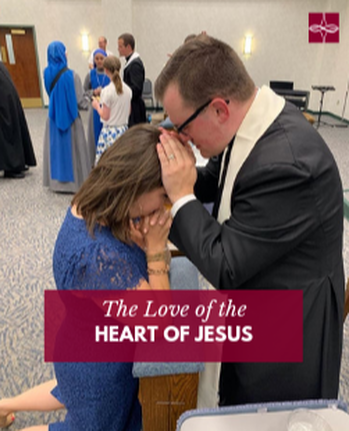


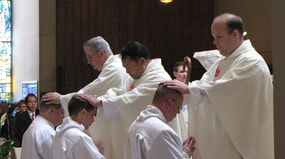
 RSS Feed
RSS Feed